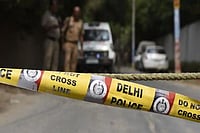An earthquake struck eastern Afghanistan early Wednesday, killing at least 1,000 people and injuring 1,500, according to latest figures from Bakhtar news agency.
Earlier, officials warned the death toll would likely rise in the 6.1 magnitude earthquake that struck Afghanistan's Khost and Paktika provinces. Neighbouring Pakistan's Meteorological Department said the epicentre was in Paktika province, just near the border and some 50 kilometers southwest of the city of Khost.
Experts put the depth at just 10 kilometers (6 miles) — another factor that could increase its impact.
A senior Taliban official has asked for international help as the country scrambles to rescue and provide relief to affected people.
"When such a big incident happens in any country, there is a need for help from other countries. It is very difficult for us to be able to respond to this huge incident," said Sharafuddin Muslim, Taliban's Deputy Minister of State for Disaster Management.
Relief efforts are likely to be complicated as the international community has largely left Afghanistan after the Taliban takeover last year amid the chaotic withdrawal of the Western military.
Taliban state-run Bakhtar news agency reported rescuers were arriving by helicopter. The news agency's director-general Abdul Wahid Rayan wrote on Twitter that 90 houses have been destroyed in Paktika and dozens of people are believed trapped under the rubble.
Footage from Paktika province near the Pakistan border showed victims being carried into helicopters to be airlifted from the area. Images widely circulating online from the province showed destroyed stone houses, with residents picking through clay bricks and other rubble.
Bakhtar posted footage of a resident receiving IV fluids from a plastic chair outside the rubble of his home and others sprawled on gurneys.
"A severe earthquake shook four districts of Paktika province, killing and injuring hundreds of our countrymen and destroying dozens of houses. We urge all aid agencies to send teams to the area immediately to prevent further catastrophe," Bilal Karimi, a deputy spokesman for the Taliban government, separately wrote on Twitter.
In neighbouring Khost province, authorities believed there are also dozens injured and dead in the earthquake as well, Bakhtar's DG Rayan said.
He added the Afghan Red Crescent Society had sent some 4,000 blankets, 800 tents and 800 kitchen kits to the affected area.
In just one district of the neighbouring Khost province, the earthquake killed at least 25 people and injured over 95 others, local officials said.
In Kabul, Taliban's Prime Minister Mohammad Hassan Akhund convened an emergency meeting at the presidential palace to coordinate the relief effort for victims in Paktika and Khost.
The "response is on its way," the UN resident coordinator in Afghanistan, Ramiz Alakbarov, wrote on Twitter.
That may prove difficult given the situation Afghanistan is in today as many international humanitarian organisations left the country after its takeover by the Taliban last year because of concerns about security and the Taliban's poor human rights record.
In the time since, the Taliban has worked with Qatar, Turkey, and the United Arab Emirates (UAE) on restarting airport operations in Kabul and across the country — but nearly all international carriers still avoid the country, and reluctance on the part of aid organisations to put any money in the Taliban's coffers could make it difficult to fly in supplies and equipment.
Pakistan's Prime Minister Shahbaz Sharif in a statement offered his condolences over the earthquake, saying his nation will provide help. At the Vatican, Pope Francis offered prayers for all those killed and injured and for the "suffering of the dear Afghan population".
Some remote areas of Pakistan saw reports of damage to homes near the Afghan border, but it wasn't immediately clear if that was due to rain or the earthquake, said Taimoor Khan, a disaster management spokesperson in the area.
According to the Pakistan Meteorological Department (PMD), the epicentre of the quake was 44km southwest of Khost in Afghanistan at a depth of 50.8km and its exact time was 1:54 am (local time).
The European seismological agency, EMSC, said the earthquake's tremors were felt over 500 km (310 miles) by 119 million people across Afghanistan, Pakistan and India.
The tremors were felt in Peshawar, Islamabad, Lahore and other parts of Punjab and Khyber-Pakhtunkhwa provinces. No loss of life or property has been reported so far.
Mountainous Afghanistan and the larger region of South Asia along the Hindu Kush mountains has long been vulnerable to devastating earthquakes.
In 2015, a major earthquake that struck the country's northeast killed over 200 people in Afghanistan and neighbouring northern Pakistan.
A 6.1-magnitude earthquake in 2002 killed about 1,000 people in northern Afghanistan.
In 1998, another earthquake of the same strength and subsequent tremors in Afghanistan's remote northeast killed at least 4,500 people.
Meanwhile, India said it is committed to provide assistance and support to Afghanistan in its "hour of need" after the war-torn country was hit by a powerful earthquake that killed around 1,000 people.
External Affairs Ministry Spokesperson Arindam Bagchi said India shares the grief of Afghan people.
"India expresses sympathy and condolences to the victims and their families, and to all those impacted by the tragic earthquake in Afghanistan. We share the grief of the people of Afghanistan and remain committed to provide assistance and support in this hour of need," he said on Twitter.
"We share the grief of the people of Afghanistan and remain committed to provide assistance and support in this hour of need," Bagchi added.
Afghan Ambassador Farid Mamundzay appreciated India's solidarity and support at this "difficult time".
"Appreciate the solidarity and support of India at this difficult time. Humanitarian situation in Afghanistan was already going from worse to worst and with the occurrence of natural disasters like the recent earthquake make life unbearable for many Afghans," he tweeted.
Mamundzay said immediate international help is required to deal with both the humanitarian crisis and the damages caused by the natural disaster.
"The casualty figure is likely to go up as search operations continue in various parts of Paktika, Khost and Nangarhar," he said.
Afghanistan has already been reeling under a severe economic crisis and food shortage following capture of power by the Taliban in August last year.
In the last few months, India sent several shipments of humanitarian assistance consisting wheat, medicines and COVID-19 vaccines for the Afghan people in view of the unfolding humanitarian crisis.
(With AP/PTI Inputs)


























